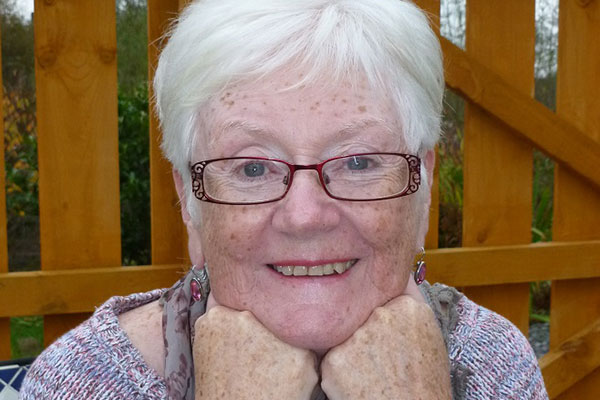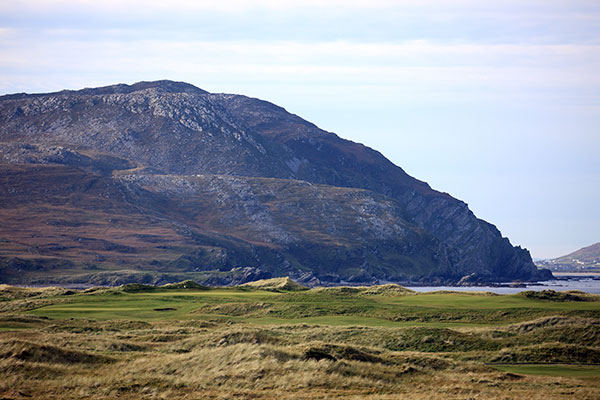BY THE time I was five, we had outgrown our small semi on the main street in Falcarragh and my parents were looking around for something larger and more modern.
Mammy had her eye on a new house, one of the pebble-dashed ones being built by the council at the back of the Main Street in Falcarragh.
As soon as she was able, she put her name down on the list and was particularly keen to get the end-of-terrace with the side plot, as it would afford her an opportunity to grow her own vegetables and save a bit of money.
So, not leaving anything to chance, she urged her friends to say a few decades of the Rosary for her and, not content with just prayers, she lobbied anyone with influence in the town.
Finally though, in one last effort to ensure success, she whispered to me to get my coat, and we set off down the hill towards the cottages.
When we reached the collection of new houses there were still a few workmen around: we could hear carpenters in several of the houses, hammering away.
Mammy put her finger to her lips and motioned for me to me to be quiet.
Quick as anything she produced a key from her pocket and before I knew it, we were standing in the hallway of the end terrace. Carefully she closed the front door.
“Nobody knows we’re here. We have to be very quick and not make a sound. Keep well away from the windows.”Mammy whispered, “Well, Ann, what do you think of the cottage?”
“It’s wonderful. It’s even got a bathroom. Will we get it?”
“Please God we will. Isn’t half the town praying for us? Only problem is, the other half is on the list.”
With that, she produced an envelope from her pocket and handed it to me. I peered inside. It seemed to be full of shiny buttons, but on closer inspection, I could see they were blue Miraculous Medals.
Small and dainty, they tinkled inside the envelope when I shook it, the portrait of Our Lady visible on the front, a sign that the wearer would benefit from her grace. I had never seen so many in one place. There must have been forty or fifty.
Mammy took the envelope back and passed a handful to me. “I’ve a notion to plant them all around the house. It’s sure to work,” she said.
“What will they do Mammy?”
“They’ll do what no earthly power can. They’ll perform a miracle.”
“A miracle? How, Mammy?”
“Well, Our Lady will look down on the medals and know that we need this house more than anyone else.”
“How will she know?”
“Well, I’ve been saying novenas for the past six months asking for her help. She’s surely got the message by now.” I wasn’t so sure and anyway I was worried that if we were found planting medals around the house, we’d get into a huge amount of trouble.
Mammy seemed unconcerned and instructed me to run upstairs, to slide one under the bath and into any little nooks or crannies I found in the bedrooms.
Later that week we heard the news that we got the end terrace, the one that she wanted so much. Lots of peoplein the town had an eye on it,but happily in the end it wentto us. My mother never had any doubt that it was due to Our Lady’s intervention, and specifically to the Miraculous Medals.
I adored my new home, and felt happier than ever, but was surprised when one day it was announced that my daddy was leaving us to take up a job in Coventry in England.
Although he had never worked away from home before, in our town this was not unusual. Many of my friends’ fathers worked in Scotland, only coming home for Christmas and other holidays.
When I came to write this memoir I had little idea about what prompted my father to take the serious step of leaving home to work in England in the late fifties. I’d always assumed it was because they needed the money, but never knew the exact circumstances.
At a recent family funeral, I met a cousin of my father’s, well into her nineties, who was able to tell me the whole story.
Tragically, Dad’s partner in the cinema, John Sweeney, died very suddenly of cancer. He was the businessman of the joint project, my dad being more on the practical side.
Without John’s financial expertise, the profits spiralled downwards. To make matters worse, Dad’s other main source of income, tailoring, was also in decline. Cheap, factory- made suits were flooding the market and it seemed there was little demand for the handmade bespoke suits he specialised in. Something had to be done.
Hearing of their troubles, my mother’s sister, in Coventry, offered a lifeline. She wrote to suggest that Dad come over to the city where opportunities were opening up, with plenty of jobs available.
As a result, he applied for a job there as a postman and was very pleased when he got it. It meant he had to go to England on his own, but at least there would be some money coming in at last.
With my father away, most evenings fell into a familiar routine. Sometimes over a cup of cocoa, Mammy would read me Daddy’s letters. They were filled with news of his work as a postman, and some of the Donegal people he’d met.
Other times she would tell me stories of her girlhood on a farm in Loughfad. The hardship of rising early in the morning to milk the cows before school, working long backbreaking
hours in the fields at harvest time. She was the second youngest of seven, and had two brothers and four sisters and they had all been expected to do their bit on the farm.
In Falcarragh, I never remember feeling poor, but I must have had some notion of it. On one occasion, whilst my dad was away in England,
I went into hospital in Letterkenny to have my tonsils out. A neighbour was taking me along with his own two children. As I was preparing to leave, Mum pressed a ten-shilling note into my fist. “Take the money and spend it on something nice for yourself.”
A week after my operation, a car pulled up outside. I ran down the path and jumped into my father’s arms. Mammy was standing on the doorstep cradling Michael, with Pat, Johnjoe and Charlie clustered around her, holding tightly to the hem of her dress.
“Welcome home, James,” she said, smiling broadly, before adding rather alarmingly, “God almighty, you’ve wasted away to nothing.”
Daddy shrugged. “I’m all right. It’s grand to see you all again.” He turned to us. “You’ve all grown so big I hardly recognise you. Here, come and say hello to your daddy.”
Daddy had been away for six months; he looked different, I hardly recognised him and my brothers suddenly seemed shy in his company, still sheltering behind Mammy’s skirts. Eventually, egged on by Mammy, Pat and Johnjoe ran up to him and he bent down and hugged them. We all dragged him inside.
Next morning, Mammy was in the kitchen, singing. I rushed downstairs to find that Daddy was still in bed.
“Your Daddy’s having a lie in,” Mammy explained. “He needs his rest. That job in England takes it out of him.”
“When are we going to live with Granny?” I asked.
Where did you hear that, Ann?”
“Daddy said it last night.”
“We’re not going now. It was just an idea. Granny invited us. But something even better is happening. We’re going to go to England. We’re going to go to England to be with your Daddy. Won’t that be grand?” Her face was beaming.
“Where will we live?” I asked.
“We’ll have a new house in England.
Daddy will have a job. England’s great. I was there after the War with Auntie Mary. I loved it. There’s shops, parks, buses, trains, everything you could ever want in a month of Sundays. We’re sure to be better off.”
Mammy made England sound so interesting, like a great adventure, and her words filled me with excitement.
None of my friends had been to England and I couldn’t wait to tell them I was going. But then I remembered that if I went to England, I wouldn’t be able to tell my friends about what it was like, as I would be leaving them behind.
For a moment I felt unsure, a bit afraid, but then Mammy reminded me I would make lots of new friends in my new home.
As she said it, her eyes lit up. I felt a great wave of joy sweep over me and I knew then I would love England too.
Ann Garratt will be signing copies of The Road Taken at the Big Comfy Bookshop, Coventry, April 25 at 3pm.



